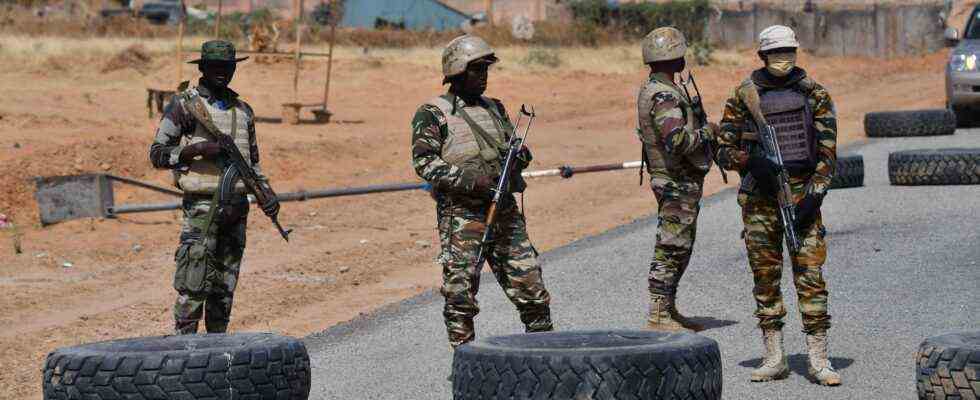Status: 15.09.2021 5:23 a.m.
According to Nigeria’s army, thousands of Boko Haram fighters in the north of the country recently surrendered their weapons. The government is reportedly planning a reintegration program.
The ex-terrorists carry colorful signs. It says: “Give up and live” or “Give up and be free”. According to Nigerian authorities, several thousand former Boko Haram fighters are said to have surrendered their weapons and asked for forgiveness. Nigeria’s government and army see the ex-jihadists’ task as a stage victory in the country’s fight against terrorism.
Babagana Umara Zulum, the responsible governor of the state of Borno, campaigns for the reintegration of the fighters and their families.
“If we don’t want to go on with the war indefinitely, then I see no reason why we should reject those who want to surrender. Some of them are innocent and have been forced into this situation. Some are teenagers, other children are 11, 12 years old. But this does not solve the uncertainty caused by Boko Haram. This is about an entire generation – a fighter has one or two women in the bush and ten children, and these children were also educated. ”
Fight with rival terrorist groups
The fact that so many ex-fighters have given up and are asking for impunity is not only due to the fight against terrorism, says security analyst Kabiru Adamu. Recently, the terrorist militias’ supply chains have been increasingly attacked – for gasoline and medicine. However, the fighting with rival terrorist groups would have driven many to give up.
“One reason is the death of the Boko Haram leader Shekau, who ultimately killed himself through fighting with ISWAP, the offshoot of the Islamic state in West Africa, who then cornered himself. We also have information that ISWAP has given top commanders from Boko Haram the opportunity to join them or leave the woods and surrender to the Nigerian military with warnings that the military would kill them. Surprisingly, many decided to give up, but to the detriment of ISWAP, they were not killed. ”
Otherwise, that would have driven potential dropouts to the IS offshoot in the future. Clear evidence of Nigeria’s successful anti-terror strategy? It depends, says analyst Kabiru Adamu.
“For every ex-warrior and his family, the first step should be: Get them out of the northeast of the country completely. Take them to rehabilitation centers. And when they get out of there, they relocate. Do not bring them back to the community where they were once radicalized and where their victims can see them. Because it is very likely that they will be frustrated with the way you react to them there and that will demotivate others who may want to give up too. That is relatively safe. ”
40,000 people killed
It is also important how the victims of Boko Haram are dealt with and communicated, says Adamu. The conflict between Boko Haram and the Nigerian government, which has lasted for 12 years, has so far cost the lives of around 40,000 people and displaced more than two million.
The fact that ex-terrorists are now to be reintegrated into society – this plan therefore also causes fears and incomprehension – especially in Maiduguri, the capital of the Nigerian state of Borno in the north of the country. This is where internally displaced people come: women, children and men who fled from the fighters of the terrorist militia Boko Haram. Or those liberated from their hometowns occupied by Boko Haram fighters by the Nigerian army. As a rule, these people have nothing left: their houses have mostly been destroyed and their few belongings have been lost.
Warning of the consequences of non-integration
To this day, hundreds of thousands of such victims are waiting for support from the state. Many of them fear that the ex-combatants’ crimes will go unpunished. Legal analyst Barrister Buhari Yusuf says dealing with the ex-terrorists could be essential to stabilize the country’s insecure northeast.
“This is an opportunity. Don’t leave these ex-terrorists with no other options but to go back and fight us again. I advise the Nigerian government and the government of Borno state to take advantage of this opportunity and accommodate these people properly. ”
For many, the fact that terrorists are giving up is a good sign. Even for parents whose children have been kidnapped by terrorists like Boko Haram. Hosea Tsambido Abanaist is the chairman of the Chibok community. The so-called Chibok schoolgirls made international headlines in 2014 when 270 of them were kidnapped by Boko Haram fighters. Many of them have since been released. But more than 100 of the young women are still missing today. Hosea Tsambido Abanaist draws hope for more children who are still kidnapped.
“We are very happy and we want this to continue until all of our children are back. Army intervention and negotiations have only brought us some of our children back. If that kind of thing makes the fighters give up, OK, let them come, the rapists, and we’ll sit down at a table. We are hopeful. ”
South Africa or Rwanda as cautionary examples
School children have been kidnapped en masse in Nigeria since December 2020 – around a thousand children and students have now been kidnapped. Often from criminal gangs who want to extort ransom. There is growing concern that the bandits might cooperate with extremists. So getting the former Boko Haram fighters to give up and placing them in deradicalization and rehabilitation centers is only a first step. Experience from other countries such as South Africa or Rwanda shows that reconciliation takes time and work with both sides – victims and perpetrators.
Reintegration? Thousands of ex-fighters from Boko Haram are giving up
Dunja Sadaqi, ARD Rabat, September 15, 2021 5:28 am

